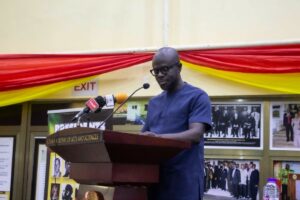AfCFTA implementation risks political, economic setbacks – Prof Abotsi

Professor Ernest Abotsi, Dean, University of Professional Studies Accra (UPSA) Law School, says political and economic ills could derail optimal implementation of the African Continental Free Trade Area (AfCFTA).
Notable among them include restrictions on human movement and goods, corruption, lack of infrastructure, Bilateral Investment Treaties (BIT) and Bilateral Trade Agreements (BTAs), and remedies for breaches of rights of members.
When fully implemented, the pact would connect about 1.3 billion people across 54 African countries through a single market for goods and services, making it the world’s largest free trade area.
However, Prof Abotsi noted that such political and economic challenges could be a major drawback to the full realisation of the benefits of the free trade agreement, expected to create inclusive and sustainable development in Africa.
Speaking at a public lecture in Accra on Tuesday evening, he said: “A critical issue to be tackled without further delay for future success of the regime is the need for the removal of all barriers impeding free movement of goods, services, and persons.”
He particularly stated that: “What I’m calling for here is the free movement of persons across African borders through the institution of visa free travels.”
The forum, organised by the Ghana Academy of Arts and Sciences was on the topic: “African Continental Free Trade Area: challenges and prospects.”
“Having undergone a process of cross-continental decolonisation for over 50 years, African countries have a business maintaining and enforcing colonial boundaries erected to preserve the interests of colonial powers of European imperialism,” Prof Abotsi observed and called for a change.
On corruption, the Dean stated that the occurrence remained a major obstacle and noted that with the inception of the COVID-19 pandemic, an opportunity had been created for corrupt officials to advance their goals.
He indicated that where traders were asked to make illicit payments or be excluded, it could lead to an excessive cost of doing business – a disincentive for business commencement and sustainability across the continent.
He, therefore, urged the African Union (AU) and the AfCFTA Secretariat to institute measures that would facilitate trade by enabling easier exchange between member countries and businesses.
The Law Lecturer also called for a structural change in the African economy from a predominantly producers of primary commodities to value addition that would create excellent products and services.
“Building or intensifying an integrated market would also require that we install supporting systemic infrastructure including roads, telecommunication networks, intra-regional air traffic, customs and border processing systems across the country,” he said.
Prof Abotsi stated that while the AfCFTA Secretariat could not legally stop member states from adopting other agreements that were not compatible with the pact, it could adopt a policy to guide BIT and BTAs.
“A core challenge that could potentially undermine the optimal enforcement of the AfCFTA regime is the issue of remedies for breaches of the rights of a member or members by a member to the AfCFTA,” he noted.
He urged the Secretariat to ensure the elimination of opportunistic application of the measure when activated by ensuring that when taken, retaliatory measures were superintended by the rule and the aegis of the Secretariat.
Source: GNA
